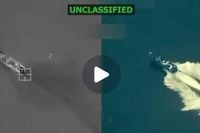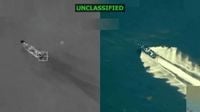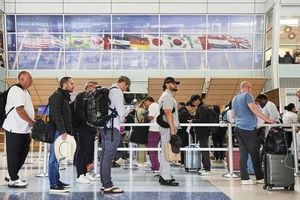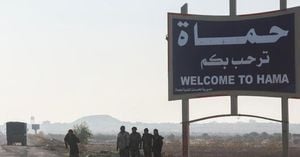On Friday, September 19, 2025, President Donald Trump announced that the United States military had carried out yet another lethal strike against a vessel accused of trafficking drugs to the U.S.—the third such operation this month. The announcement, made via Truth Social, included a dramatic video of the targeted boat erupting into flames, underscoring the administration’s uncompromising new approach to combatting narcotrafficking in the Caribbean and South America.
“On my Orders, the Secretary of War ordered a lethal kinetic strike on a vessel affiliated with a Designated Terrorist Organization conducting narcotrafficking in the USSOUTHCOM area of responsibility,” Trump wrote in his post, as reported by TNND and UPI. He further emphasized, “Intelligence confirmed the vessel was trafficking illicit narcotics, and was transiting along a known narcotrafficking passage enroute to poison Americans.” According to Trump, the strike killed three “male narco-terrorists” in international waters, while no U.S. forces were harmed in the operation.
This latest strike is part of a rapidly escalating campaign. In the past few weeks, the U.S. military has launched four strikes in total against vessels suspected of ferrying illegal narcotics toward American shores. The first two operations targeted speedboats reportedly originating from Venezuela, with the initial attack on September 2 destroying a vessel operated by the notorious Tren de Aragua gang and resulting in the deaths of eleven suspected narco-terrorists. Trump has consistently argued that these “extremely violent drug trafficking cartels pose a threat to U.S. national security, foreign policy, and vital U.S. interests.”
While Trump’s rhetoric has been forceful—he implored, “STOP SELLING FENTANYL, NARCOTICS, AND ILLEGAL DRUGS IN AMERICA, AND COMMITTING VIOLENCE AND TERRORISM AGAINST AMERICANS!!!”—the campaign has not been without controversy. The administration has designated several transnational gangs and cartels, including Tren de Aragua and the Sinaloa Cartel, as foreign terrorist organizations. This move, announced in February 2025, paved the way for the military to be used against what had previously been treated as criminal enterprises, not enemy combatants.
The shift from law enforcement to military action has raised alarms both domestically and internationally. Traditionally, the U.S. Coast Guard, sometimes with Navy support, handled drug interdiction as a matter of law enforcement. Now, the Defense Department is taking the lead, with Special Operations personnel executing the strikes. According to UPI and The New York Times, legal experts have questioned the legality of these operations, arguing that they may target civilians and lack sufficient legal justification.
Democratic lawmakers have been particularly vocal in their criticism. Senator Jack Reed of Rhode Island, the top Democrat on the Senate Armed Services Committee, condemned the strikes as “an outrageous violation of the law and a dangerous assault on our Constitution.” Reed added, “No president can secretly wage war or carry out unjustified killings – that is authoritarianism, not democracy.” Senators Adam Schiff of California and Tim Kaine of Virginia went a step further, filing a war powers resolution to block the ongoing strikes. “Congress alone holds the power to declare war,” Schiff said, warning that “blowing up boats in the Caribbean without any legal authority risks dragging the United States into another war, and provoking attacks against American citizens.”
Republican Senator Rand Paul also expressed concerns, particularly about the erosion of due process rights for suspected criminals. Legal scholars from both sides of the aisle have echoed these worries. John Yoo, a former Justice Department official under President George W. Bush, told POLITICO, “We can’t just consider anything that harms the country to be a matter for the military. Because that could potentially include every crime.” Yoo’s comments reflect a broader debate about whether suspected cartel members can legally be treated as enemies of war rather than as criminals entitled to trial.
Internationally, the response has been equally tense. The Venezuelan government, led by President Nicolás Maduro—whom the Trump administration has labeled a cartel leader—has condemned the U.S. strikes as acts of aggression. After the first attack, which killed eleven people, Venezuelan officials claimed the targeted vessel was not carrying drug traffickers but ordinary citizens returning south. In response to the escalating U.S. military presence, Venezuela has deployed about 22 aircraft and 30 vessels, including 12 navy ships, for defensive maneuvers near La Orchila Island, roughly 100 miles off Caracas. Maduro has described the U.S. warships stationed off Venezuela as an “absolutely criminal and bloody threat.” Earlier this month, Venezuelan fighter jets flew provocatively over a U.S. Navy ship, an incident described by several Defense Department officials as a deliberate provocation.
Amid these rising tensions, the Trump administration has sent several U.S. Navy warships to the waters off Venezuela and deployed 10 F-35 fighter jets to Puerto Rico for anti-cartel operations. The administration’s stance is clear: the illicit activities of these cartels “have wrought devastating consequences on American communities for decades, killing millions of American citizens,” Trump posted. “NO LONGER.”
Despite the administration’s insistence on the necessity of these strikes, the lack of transparency and congressional oversight has fueled criticism. Lawmakers such as Schiff and Kaine have demanded full briefings and a clear legal rationale for the operations. Schiff stated, “If the administration believes there is a case to make for a war authorization—it should make it. But this unauthorized and illegal use of our military must stop.”
The debate over the legality and wisdom of using military force in drug interdiction operations is likely to intensify as the strikes continue. With seventeen people killed in three U.S. airstrikes on suspected drug-running vessels this month alone, according to POLITICO, and a fourth strike announced by Trump on September 20, 2025, the stakes are rising both for U.S. foreign policy and for the rule of law at home.
As the United States presses forward with its aggressive new approach, the world is watching closely to see whether the campaign will curb the flow of narcotics—or trigger a broader conflict in the region. The coming weeks may prove decisive, as Congress, the courts, and international actors weigh in on the Trump administration’s unprecedented use of military force in the war on drugs.





